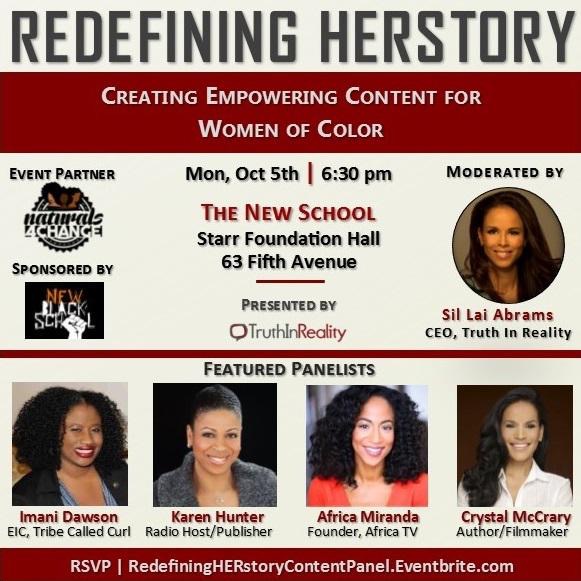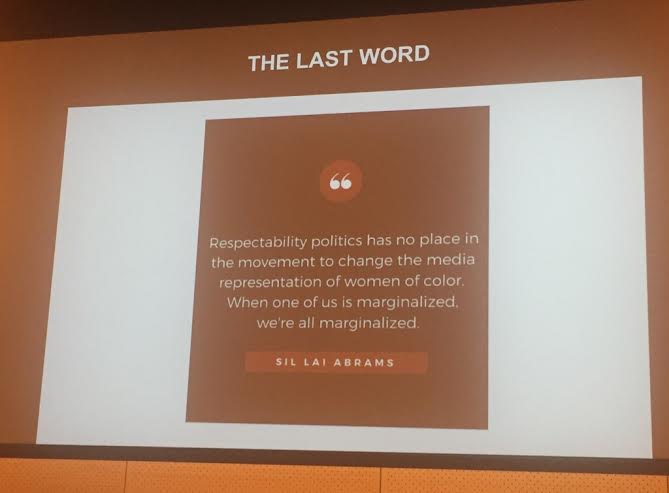Redefining HERstory

This past Monday on October 5th, I had the chance to attend the panel “Redefining HERstory” a content creation panel presented by Truth in Reality and cosponsored by Naturals 4 Change and New Black School. Having never heard of Truth in Reality, I had no idea what to expect but knew anything that was about the “empowerment of women of color” was for me. When I got there I was instantly greeted, given a sign, and free natural hair goodies – which is always a plus. As I sat there eagerly waiting for the event to start, I could have never imagined the amount of information and knowledge that would be shared with me in the following two hours.
Our hostess with the most-ess was Sil Lai Abrams, the Founder and CEO of Truth in Reality. She floated around the room looking fabulous and once she started speaking you could tell that disrupting the narrative often pinned to women of color was a genuine passion of hers and that she would dedicate her life to making sure new stories were being told.
After Sil Lai’s moving opening speech, she introduced the driven, real, wise, and humble panelists. These four ladies were Africa Miranda – TV star and founder of Africa TV, Karen Hunter – a well-known author, publisher and radio host, Imani Dawson – writer, TV producer and Founder of Tribe Called Curl and Crystal McCrary -author, filmmaker and former entertainment attorney. Sil Lai asked these ladies raw questions that yielded answers that left the audience in awe, constantly nodding their heads in agreement. Let’s just say with all the gems the panelists were dropping, I couldn’t tweet fast enough. They spoke in depth about the images often portrayed of women of color, especially Black women, in the media and how they were inspired to create change and share the stories that are mostly ignored.
What was most valuable to me was that each panelist shared bits of themselves with the room. Africa Miranda explained how a previous experience with reality television was one of the main motivating factors behind why she decided to take control of content and more importantly, her story. She decided that she would be the one calling the shots and wouldn’t just be the girl who “beat that b*tches ass” in the bathroom while on “The New Atlanta.” Imani Dawson opened up by mentioning how beautiful the room looked full of natural women with bright lip colors – something that she wouldn’t have seen 20 years ago. She explained that she’d often felt like an outsider and decided that she wanted to be a writer. Karen Hunter noted that one moment where everything “got real” and she realized that media can shape how people think and feel about things was the night that Amadou Diallo got shot. She was working at the New York Times, reading the editorial page about the shooting and realized that the voice being shared was not her own. She stated that in that moment, she felt owned and she could not go on without sharing the other side. Crystal McCrary spoke about always wanting to tell stories from the time she was a little girl and how her goal is to “create content that is filled with integrity and that represents us, in a truthful way.”
After Sil Lai’s questions, audience members got the chance to take part in a Q&A session with the panelists. One attendee asked how the panelists felt about Lee Daniel’s comments regarding hiring black people to write for black voices and they (and I) unanimously agreed that it’s fair. Karen Hunter explained that often other races pick the people that will make them feel comfortable and that it’s seen as building a legacy. She went on to say that when she picks black people to work with, it should be seen as the same thing – building a legacy. Africa Miranda followed up by saying sometimes Black people shy away from picking their own when trying not to seem racist. She explained that it’s something she likes to call “you’re so busy trying to prove that you’re African-American, that you forget that you’re Black.”
Another question that seemed to be on a few people’s minds is how to gain fans and have drama in TV shows without the stereotypical fighting and arguments. Crystal McCrary explained that when she creates her work there’s a level of dignity each character needs to maintain. She explained that there is a way to tell the story without degrading women and you shouldn’t be actively writing drama into your content simply to check the “I’ve got some drama incorporated” checkbox. She went on to say that there can be drama including disagreements and arguments but the image portrayed can still keep up a certain level of integrity.
When a question about how to finance projects came up, Africa Miranda emphasized that “you don’t need $20,000 to create a quality project.” This is something that artists often struggle with. They believe that they need huge budge to create greatness but it is being proven that that is not true. Asha Boston shared a clip of a series she started entitled, The Dinner Table Doc which is dedicated to sharing the unique and multifaceted stories of various black women as they sit and talk around a dinner table as opposed to arguing over one. Asha let it be known that she created her first episode for free.99 and that it is possible to create great content on a budget.
The evening closed with a few surprises including a gift bag giveaway and a beautiful live performance from Priscilya Marie whose EP #NoFilter recently dropped. We were then able to network with the panelists and fellow audience members and took a group picture with the panelists. I sincerely thank Truth In Reality, Naturals 4 Change and New Black School for throwing such an amazing event with the perfect panelists. I left feeling inspired and ready to redefine our stories.



